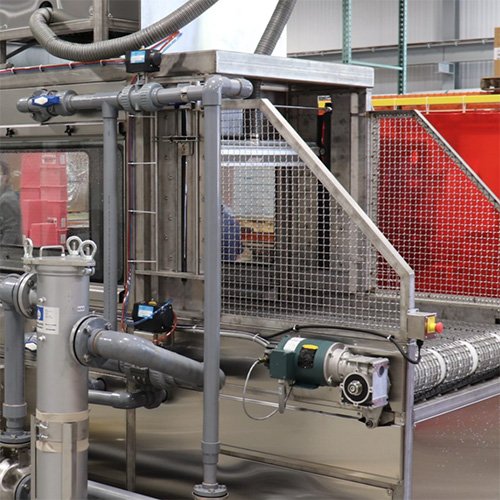Industrial operations demand meticulous cleaning of parts and components to uphold efficiency and product quality. Here, industrial part wash systems play a pivotal role. These systems are designed to eliminate contaminants such as oils, grease, and dirt from a variety of industrial parts, ensuring they adhere to cleanliness standards and operate optimally.
Types of Industrial Part Wash Systems
Immersion Wash Systems
Immersion wash systems submerge parts in a cleansing solution to eradicate contaminants. This method proves highly effective for parts with intricate geometries or inaccessible areas.
Spray Wash Systems
Spray wash systems employ high-pressure sprays to swiftly and efficiently cleanse parts. They excel in eliminating stubborn soils and contaminants from expansive or flat surfaces.
Ultrasonic Wash Systems
Ultrasonic wash systems utilize ultrasonic waves to agitate the cleaning solution, effectively dislodging contaminants from parts’ surfaces. This method is particularly advantageous for delicate parts or those with intricate features. Ultrasonic wash baskets are often used to handle parts within these systems.
Key Components of Industrial Part Wash Systems
Irrespective of the type, industrial part wash systems comprise several crucial components:
Wash Chambers
Wash chambers serve as the nucleus of the cleaning process. They are meticulously designed to accommodate diverse part sizes and shapes and may feature adjustable racks or baskets for seamless loading and unloading.
Pumps and Filters
Pumps facilitate the circulation of the cleaning solution throughout the system, while filters eliminate debris and contaminants to ensure optimal cleaning performance.
Heating Elements
Heating elements maintain the cleaning solution’s temperature, crucial for effectively removing stubborn contaminants.
Drying Systems
Drying systems employ hot air or alternative methods to expel moisture from parts post-cleansing, thwarting corrosion and ensuring readiness for subsequent processing.
Operational Principle
Industrial part wash systems typically embrace a multi-stage cleaning process to achieve comprehensive cleaning outcomes. This process typically encompasses pre-washing, washing, rinsing, and drying stages, each tailored to precise cleaning requisites.
Advantages of Industrial Part Wash Systems
The adoption of industrial part wash systems yields manifold benefits:
Enhanced Cleaning Efficiency
Industrial part washers consistently deliver thorough cleaning outcomes, ensuring parts are devoid of contaminants and primed for use or further processing.
Heightened Productivity
By automating the cleaning process, industrial part wash systems streamline operations, fostering heightened productivity. With diminished manual labor demands and accelerated cycle times, companies can realize elevated throughput and meet production deadlines expeditiously.
Cost Savings
Investment in industrial part wash systems can translate to enduring cost savings for businesses. By curbing the necessity for manual cleaning labor and diminishing water and detergent consumption, these systems curtail operational costs and enhance overall profitability.
Considerations When Selecting
When selecting an industrial part wash system, several factors warrant consideration:
Specific Application Requirements
Different industries and applications entail unique cleaning prerequisites. Factors such as part size, material composition, and cleanliness standards should inform system selection.
Cleaning Process Flexibility
Opt for systems offering flexibility in cleaning processes to accommodate diverse part geometries and contamination levels. Customizable wash cycles and adjustable parameters enable precise cleaning tailored to specific requirements.
Reliability and Durability
Select a reputable manufacturer renowned for crafting high-quality equipment capable of withstanding the rigors of industrial environments and delivering consistent performance over time.
Environmental Impact
In the current eco-conscious landscape, opt for an industrial part wash system boasting sustainable features. Look for systems integrating energy-efficient components, minimizing water consumption, and utilizing eco-friendly detergents to diminish environmental footprint.
Ancillary Equipment for Industrial Wash Systems
In addition to industrial part wash systems, ancillary or support equipment plays a crucial role in enhancing their effectiveness. One such example is stainless steel baskets, which are commonly used in conjunction with wash systems to hold and organize parts during the cleaning process. These baskets are designed to withstand the harsh conditions of industrial environments and provide optimal support for parts of various sizes and shapes. With their durable construction and customizable configurations, stainless steel baskets facilitate efficient loading and unloading of parts, ensuring thorough cleaning and maximum utilization of the wash system’s capabilities. Additionally, they help prevent damage to delicate parts and promote uniform cleaning results. In essence, equipment like stainless steel baskets can complement industrial part wash systems, contributing to overall efficiency and effectiveness in part cleaning operations.



